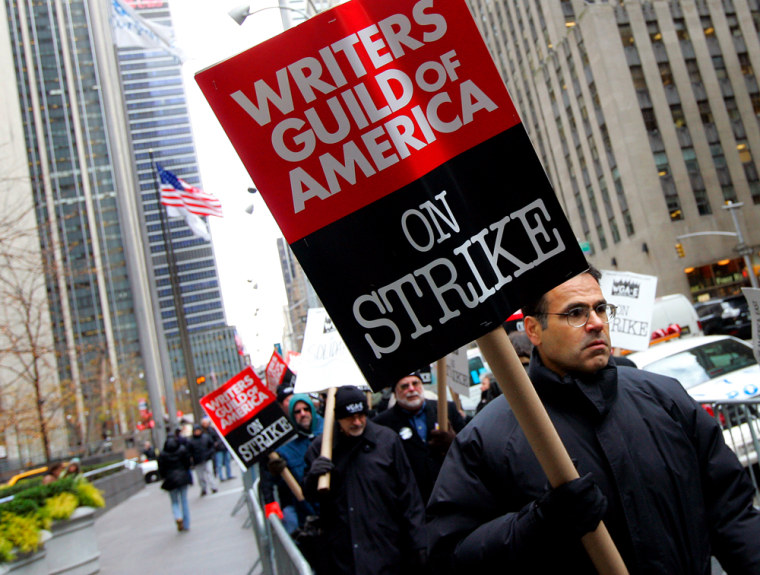The TV industry braced Tuesday for what could become a long strike by writers, even as both sides returned to the bargaining table.
Leslie Moonves, chief executive officer of CBS Corp., told an investor conference in New York that he was hopeful, but “not terribly optimistic.”
The two sides conceded there was likely to be ratings shortfalls if the five-week strike dragged on, Moonves said. Programming costs would fall as well, resulting in no significant financial impact to the network in the short to medium term, Moonves said.
Bargaining resumed in Los Angeles after a four-day recess, with a relatively scant $21 million separating contract proposals by studios and striking Hollywood writers.
The more telling figure involves the $20,000-plus that writers now earn for a single network rerun of a TV episode and the $250 the studios are offering for a year’s online reuse of an hourlong show. That represents the chasm between the old business order and burgeoning new media faced by negotiators as they try to end the strike, now in its fifth week.
The strike has shut down production on dozens of prime-time and late-night shows, sending a number of programs into reruns.
Still, Moonves said CBS viewers will be served.
“We are prepared to have a full schedule” in the spring, he said. “We’re certainly not going to go dark.”
He said the schedule will include programs from Showtime, the network’s sister cable channel that offers daring fare including “Weeds” and “Dexter,” a serial-killer drama.
The shows will be edited for network use, a CBS spokesman said.
The walkout could soon affect the development of pilot episodes, which networks use to determine which series they will order for the next season. The process typically begins early in the year.
“If the strike is protracted, pilot season will be potentially ruined. Everything starts from the script,” said Matt Edelman, a film and TV producer who now is chief executive officer of a lifestyle Web site, PeopleJam Inc.
However, Marc Berman, an analyst for Mediaweek, noted that networks have been cutting back on pilots for several years to save money.
Last Thursday, before negotiations recessed, the Alliance of Motion Picture and Television Producers said it was willing to offer $130 million in extra pay over the life of its proposed three-year deal, on top of the $1.3 billion already paid annually to writers.
The Writers Guild of America countered by saying the proposal only addressed advertising-supported programs streamed for free on the Web and jurisdiction over shows made for the Internet. It said the offer constituted a “massive rollback.”
The writers said their plan, also presented Thursday, would cost producers $151 million over three years. Details of that plan were not publicly disclosed.
However, citing an unidentified person close to guild negotiators, the Hollywood Reporter trade publication said the union was proposing fixed compensation rates that also are graduated in increments tied to viewership.
David W. Rips, director of the media and entertainment practice at Deloitte Consulting, said there wasn’t enough information about the value of digital distribution to “have a legitimate negotiation” on compensation.
He suggested the alliance offer was an attempt to shift the decision a few years into a better-informed future.
“I’m surprised producers offered a flat fee at all,” Rips said. “I don’t think they would even be tacitly acknowledging that there’s any relationship between that payment and real revenue.”
